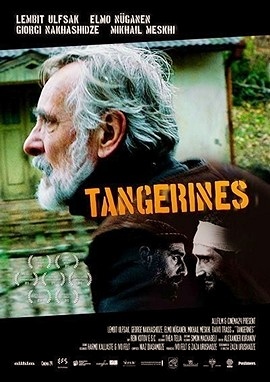A Bittersweet Experience of War
Tangerines . A film written and directed by Zaza Urushadze, an Estonia-Georgia co-production, 2013.
January 8, 2015 -
Dominik Wilczewski
-
Books and Reviews

Zaza Urushadze’s Tangerines is a film that deals with a topic that has somewhat been erased from today’s perspective: the 1992-1993 war in Abkhazia. The issue of Abkhazia’s legal status, however, remains relevant as evidenced by the Georgian-Russia war of 2008 and its further political consequences. This reason is enough for Tangerines, a 2013 Estonian-Georgian co-production, to spark vast interest, though the greatest strength of the film is its artistic merit which, because of its universal nature, could be of interest to a wider audience and not only to those viewers who are keen enthusiasts of the Caucuses.
Overall, the film sheds new light on a somewhat lesser-known aspect in the most recent history of Abkhazia and the war in Georgia in the early 1990s. This mountainous republic used to be a multi-ethnic territory before the outbreak of the war. Aside from the Abkhazians and the Georgians, who both claim rights to the land, the area was also inhabited by Russians, Armenians and Estonians. The first settlers from the Baltic region came to Abkhazia even before the formation of the Soviet Union. When the war broke out in the early 1990s, however, a majority of Estonians decided to move back to their distant native land that, incidentally, had just recently gained its own independence.
The main character in the film, an old carpenter named Ivo, is Estonian. Nearby lives his countryman, Margus, the owner of a tangerine plantation (hence the film’s title), Abkhazia’s biggest export. Both men are among the very few Estonians who did not leave. The war, however, is approaching fast. Consequently, the Estonians cannot avoid its effects. One day during the conflict, they rescue a couple of wounded soldiers who were fighting on opposite sides: one of them is a Georgian national and the other is a Chechen mercenary. Ivo gives shelter to both of them in his house. Immediately after the injured soldiers regain consciousness, their combat readiness and desire for revenge reappear. To counteract an escalation of a conflict, the old Estonian attempts to mediate the two hot-blooded Caucasians. In doing so, he uses his position of a host, and also of someone who saved their lives demanding that they do not harm each other under his roof. As a result, there is peace in the war for some time, at least on this little piece of land where Ivo’s farm is located.
This film highlights faith in humanity and the human ability to be stronger than war or any ethnic, political or religious divisions. The 20th century specifically, as well as the present times, have seen on many occasion this faith put to the test. For that reason, Tangerines might easily be accused of naiveté and being a film that has little to do with reality. The filmmakers do not offer any simple solutions, however. To avoid revealing too much of the story, it can only be said that although there is no happy ending, war does not allow for happy endings, the belief in humanity is restored nonetheless.
Undoubtedly, one of the film’s greatest strengths is the brilliant performance by the main actors. From the viewer’s perspective, this lends credence to the motivations behind the protagonists’ actions. Lembit Ulfsak, an outstanding Estonian theatre and film actor who plays the role of Ivo, deserves the highest praise. He is incredibly effective in the way he portrays his character lacking in anger, which clearly distinguishes him from the two soldiers whose lives he saved. Instead, he exudes wisdom and a natural air of authority.
Tangerines, a Georgian-Estonian co-production, is the first such co-production in the history of the cinematography of both countries. The film was shown at the 29th Warsaw Film Festival in October 2013 where it was well-received both by the jury and the audience. Zaza Urshadze won the prize for best director during the festival. In its comments, the jury stated that Urshadze “managed to tell a simple yet very powerful story by creating a bittersweet world, warm and delicate.” The audience also chose Tangerines as the best feature film of the festival.
The film can be compared to another Georgian picture that was shown at the same Warsaw festival a few years, in 2009. It was titled The Other Bank. Its script was co-written by Rustam Ibragimbekov, who had collaborated with Nikita Mikhalkov in the Oscar-winning Burnt by the Sun. The Other Bank also takes on the topic of the Abkhazia war, and even more so its consequences, by focusing on the life of a young Georgian refugee from Abkhazia and tracing his dramatic journey to his homeland.
During the Cold War, Georgian cinematography, associated with such names as Sergei Parajanov, Georgiy Daneliya and Otar Iosseliani, could easily be considered one of the most artistically prolific among all the Soviet republics. Repentance by Tengiz Abuladze, a film that offers a critical review of Soviet history, was awarded the Special Jury Prize at the Cannes International Film Festival in 1987 and has been rated among the most outstanding achievements of Soviet cinematography. At the same time, it is one of the most conspicuous films that symbolises the perestroika period.
Despite their low budgets, the two Georgian films, Tangerines and The Other Bank, have strong scripts and excellent performances. They are also a proof that Georgian cinematography still has a vast potential. The awards and acknowledgment that the Georgian films receive at international film festivals draw the interest of international audiences. All in all, their authors have demonstrated that they are able to take on difficult and complex issues and deal with painful episodes abundant in Georgia’s most recent history.
Dominik Wilczewski is a political scientist and co-author of Program Bałtycki (Baltic Programme) in Radio Wnet. He contributed to several web portals including pl.delfi.lt, zw.lt and eastbook.eu.

































